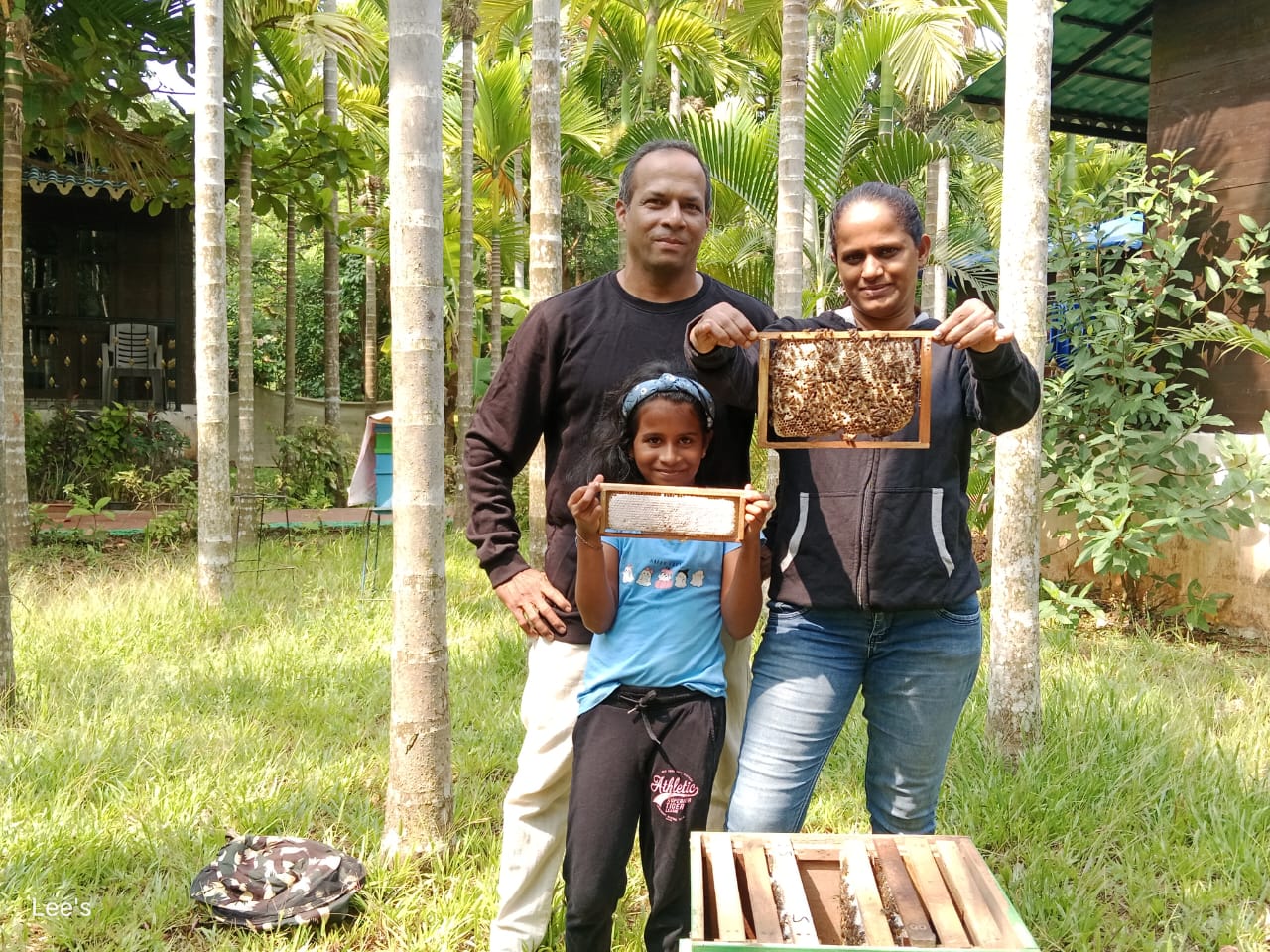Goan beekeeper Lessley Pereira shares his adventurous journey into the world of bees and his honey-making business – Lee’s Bee’s

THE GOAN PANAJI
“Rearing bees and watching them work is not only fascinating, it’s like meditation. It takes one on a spiritual journey. And it’s calming too, just like the sweet honey that these bees produce after a laborious task. My life has been smoother and sweeter after bees came into my life,” shares Lessley Pereira, proprietor of Lee’s Bee’s who has been in the honeybee keeping and pollination services since 2020, kick-starting the business during the pandemic.
The honey produced in Goa has good demand but the actual supply is low. Goa offers multi-flora honey. Lessley even has sour-sweet honey from tamarind tree flowers which is rare and different in taste. He sells honey and other bi-products of wax like lip balm and pain relievers. His prices range from Rs 130-1800. What he sells is ripened honey, which has a longer shelf life. In actuality, there’s no expiry date for honey. If preserved well, in room temperature, it can last for hundreds of years, and the older it is the more medicinal properties it gains.
Currently Lessley has four units where he installs the bee hives, and keeps some units even at his home. Supported by his wife Sweta and daughter Leeome, Lessley nurtures 30 plus boxes and the maximum honey that he produces in one season is up to 80 kgs. However, there is no guarantee that the same quantity will be produced every season as it depends on many associated factors. The honey production capacity depends upon the season and climate. In Goa the flowering pattern is not the same all over. At Cavelossim the major honey flow is during February to May, at other locations it could start even before February.
While extracting honey from honey combs at the end of the season, Lessley makes sure that enough honey is retained for the bees so that they don’t have to struggle in the monsoon. Bees have the ability to fly and get the nectar from 1-1.5 km radius, but the closer the flowering trees are, the better for the bees, feels Lessley. Post monsoon, he has plans for expansion and keeps his bee hives in Mollem, Sanguem and Rivona. Currently he keeps them in Cavelossim, Benaulim and Seraulim.
Goa has four varieties of honeybees – Apis cerana indica, Indian bee, Tetragonula sp and Stingless bee. Honey is just not a liquid. It’s complete food. Apart from its medicinal properties, honey is consumed in edible form and applied with other herbal, medicinal plants as a concoction to soothe various skin disorders, cuts, wounds and other ailments. “Imagine every home in Goa keeps one or two bee hives and produces honey for home consumption...It would make a huge impact and go a long way in restoring health and environment, both,” suggests Lessley who is completely committed to his new-found passion of beekeeping and producing honey for commercial purpose.
Beekeeping serves many purposes for this pet-lover who quit his 14-year job in the cargo department in the aviation industry in Dubai and Abu Dhabi international airports, he returned to his roots in Goa, and started a pet shop, which had to shut during the pandemic. Bees ignited Lessley’s curiosity and wanting to learn more about them he underwent basic training in beekeeping through an online course offered by the Goa government’s Krishi Vigyan Kendra before procuring the first colony of bees.
The role of bees in pollination and balancing the biodiversity is very vital and crucial. Lessley’s natural instinct to discover something unique and innovative led him to embrace honey bee-keeping as a passion which turned into a profession within four years. He recalls, “With many trial and error experiences, and losing many colonies, I challenged myself to learn why it happens and how to fix the issues I faced. Gradually I studied the bees and their behaviour patterns. The more I learnt about them, the more I was drawn towards this tireless workforce. One needs love, care, dedication, courage and total closeness to nature, which is difficult to find in today’s world. But being with bees makes one a complete person – peaceful and satisfied.”
Lessley trains and supports enthusiastic learners in beekeeping in association with the Goa Khadi and Village Industries Board. Lee’s Bee’s honey types are many, and there are bi-products from wax, like lip balm and pain relievers. His wife Sweta helps Lessley with the marketing of their brand and bee-wax products. People invite him to keep beehives in their farms, so that their farm yield increases. In return we also get abundant honey. There is no need to have flowering trees around – even jamun, tamarind, rose apple, love apple, soap-nut (ritha), surangi and avocado trees are beneficial.
Beekeeping is not just a business. As they are an important part of the ecosystem and without them human beings and the planet will not survive, farmers should rear bees to enhance their agricultural produce, suggests Lessley who had to struggle initially, and had to undergo a tough time in preparing himself to indulge in a new venture. However, his hard work and smart thinking changed the scenario. Today he is a happy beekeeper, selling honey from home. He even introduced new methods in beekeeping to make it more efficient with a pure practical point of view.
“Goa’s youth who wait for government jobs have enough opportunities to flourish, and be self-dependent. They can choose a good source of earning like beekeeping, which requires very less capital and no big space. There is a government subsidy of 90 % for the honey bee keepers. It does not need much capital investment, and can be started with Rs 7000. Having a small backyard or kitchen garden also suffices the bees to survive and thrive, as they travel to flowering trees to collect their nectar. Bees ensure food security and conserve nature and preserve biodiversity,” he concludes.